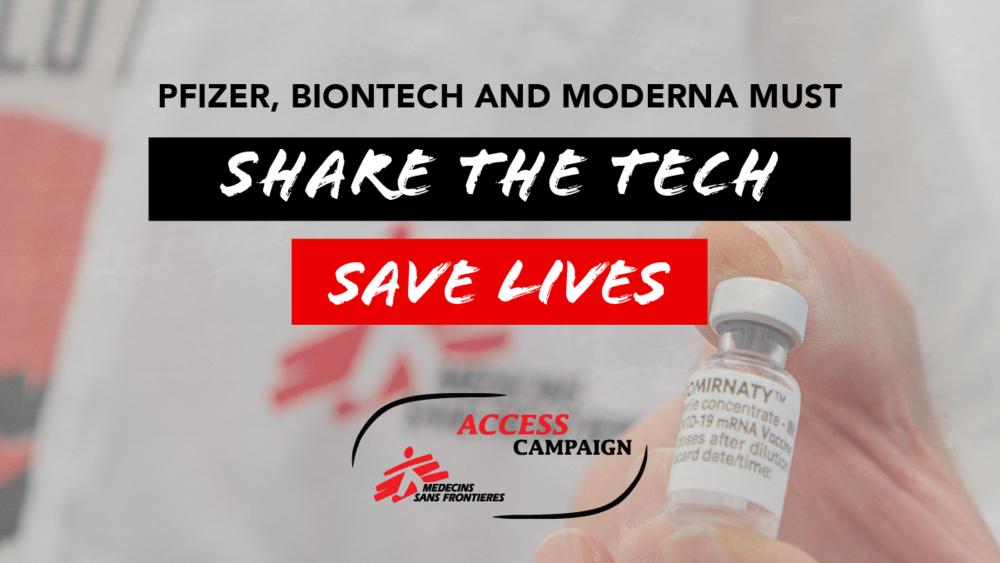The COVID-19 pandemic race to develop new vaccines has brought with it the introduction of revolutionary new technology: mRNA-based vaccines. Where available, mRNA-based COVID-19 vaccines are one of the tools saving millions of lives and slowing transmission of the virus – but too many people are being left behind waiting for access.
It´s not just that there aren´t enough vaccines being produced- it´s that control over who can produce and access vaccines is left to only a handful of pharmaceutical corporations, even though governments contributed billions in public money to the research and development (R&D) of these vaccines.
The World Health Organization (WHO) has set up a mRNA COVID-19 Vaccine Technology Transfer Hub in South Africa to allow producers to set up manufacturing on the continent. But so far, no company with an approved mRNA vaccine has stepped forward to contribute their technology and know-how, even though several producers have joined the hub and are ready to start manufacturing.
Pfizer, BioNTech and Moderna must share their technology with the hub as a matter of urgency- here are 4 reasons why:
1) Technology sharing will reduce dependence on vaccine imports for African countries

Establishing mRNA vaccine production at an existing manufacturing site in at least one African country could create an annual production capacity of up to 100 million COVID-19 vaccine doses within 10 months.
Currently, African countries are almost entirely dependent on imports and donations of COVID-19 and other vaccines, contributing to staggering vaccine inequity, and limited and delayed access for most countries on the continent. If BioNTech, Pfizer and Moderna made their technology available via the WHO tech transfer hub, manufacturers on the African continent including in Egypt, Tunisia, Morocco and South Africa could not only produce vaccines independently, increasing global supply by hundreds of millions of doses per year, but they would also have a say in where the vaccines went and who can access them.
2) mRNA vaccines are faster and cheaper to produce than traditional vaccines

While creating capacity for traditional vaccine manufacturing platforms can take years, mRNA technology is agile and adaptable, meaning that manufacturing capacity doesn’t need to start from scratch - existing manufacturers that already make injectable medicines could produce mRNA vaccines comparatively simply.
For example, BioNTech turned a cancer antibody factory into an mRNA vaccine factory in only six months, complete with regulatory approval; and Rovi, a Spanish manufacturer of injectable, non-biologic medicines, will soon be producing Moderna’s vaccine active pharmaceutical ingredient.
MSF has already identified seven manufacturers in African countries that have the capacity to start producing mRNA vaccines. If Pfizer, BioNTech and Moderna shared this technology and knowledge, African manufacturers could start production on mRNA vaccines in just 10 months.
3) mRNA vaccines are effective and easy to modify

mRNA vaccines have shown to be the most effective vaccines so far in preventing COVID-19 infection and the most adaptable to new variants. It took Moderna only about 30 days to develop an adapted version of their mRNA vaccine for a new COVID-19 variant and have it ready to be used in a Phase 1 clinical trial. In contrast, the shortest time to adapt more traditional vaccines for a COVID-19 variant has been five months.
This technology could potentially be adapted to target other infectious diseases, meaning the same platform can be ‘switched’ to produce different vaccines or even therapeutics. Therefore, building capacity to produce mRNA vaccines within a region could potentially have longer-term and far-reaching impact, beyond urgently supplying COVID-19 vaccines.
4) Donations and ‘fill and finish’ deals aren´t enough

Existing measures to distribute the vaccine among low- and middle-income countries simply aren´t enough. While the fastest way to save lives, and avoid wastage of doses, is for high-income countries to urgently redistribute excess doses to low- and middle-income countries via the WHO´s COVAX Facility, this is only a short-term solution.
´Fill and finish´ deals such as the one signed between Pfizer-BioNTech and South African manufacturer BioVac in July 2021 are similarly insufficient. This is a first step, but it doesn´t go far enough to establish vaccine independence on the African continent, as it requires the partner manufacturer to rely on the developer to produce the vaccine. To ramp up production on the scale we need, as many manufacturers as possible need access to all of the components and know-how of vaccine production, from the starting production steps through to manufacturing and packaging.
When the pandemic was first declared, world leaders talked about the vaccine being a global public good and urged the world to show global solidarity.
18 months later, the reality on the ground couldn´t be further from this. While some high-income countries have far more doses than needed, vulnerable people in low-and middle-income countries are still waiting for their first dose. Instead of profiteering from this publicly funded technology, Pfizer, BioNTech and Moderna must ensure that as many manufacturers as possible can produce mRNA vaccines.
We have the tools to address vaccine inequity and protect millions more people from COVID-19. The only reason these vaccines aren’t being produced more widely is because Pfizer, BioNTech and Moderna aren´t allowing it.
Pfizer, BioNTech and Moderna: share the vaccine technology to save lives NOW.
